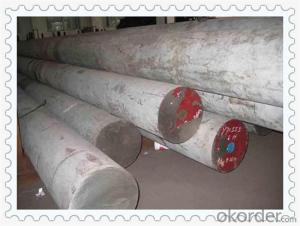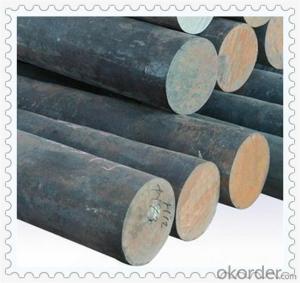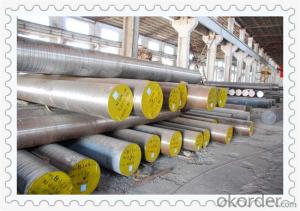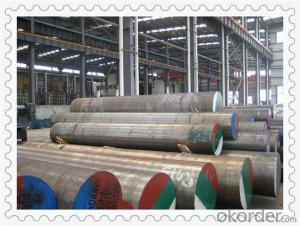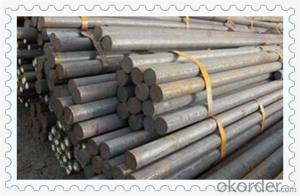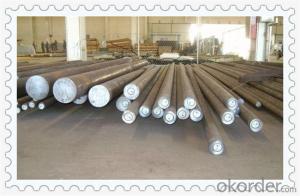Q345B st52-3 Cr50 S355JR Steel Round Bar
- Loading Port:
- China main port
- Payment Terms:
- TT OR LC
- Min Order Qty:
- 5 m.t.
- Supply Capability:
- 100000 m.t./month
OKorder Service Pledge
OKorder Financial Service
You Might Also Like
Item specifice
Q345B st52-3 Cr50 S355JR Steel Round Bar
1. Grade:Q345B, Q235B, SS400, HRB335, ST52-3
2. Hot-rolling
3. DIa:10-300mm
4. MOQ:20tons
5. Chemical and physical properties
Grade | C | Mn | Si | P | S | Yield Point(Mpa) | Tensile Stregth(Mpa) | Elongation (%) |
ST52-3 | ≤0.22 | ≤1.60 | ≤0.60 | ≤0.040 | ≤0.040 | ≥325 | 490 630 | ≥18 |
HRB335 | ≤0.25 | ≤1.60 | ≤0.80 | ≤0.045 | ≤0.045 | ≥335 | ≥490 | ≥16 |
6.Size Tolerance
Length tolerance: +100mm/-0mm
Side length tolerance: +/-2mm
Straightness: max 6mm/m
The mill test certificate shall show the chemical composition, and it is guaranteed that the chemical composition shall be within the limit stipulated in the contract.
We are engaged to offer wide range of steel products: steel round bar, square steel, such
as SS400B, S20C, S45C, Ck45, SAE1020B, SAE1045B, SAE4140, SAE4150, SAE4340,
SAE8620, 42CrMo4, 15B36Cr, S50C, S65C. 20Cr,40Cr.The diameter ranging from 20mm
to 300mm. Hot-rolled/forged/cold drawn.
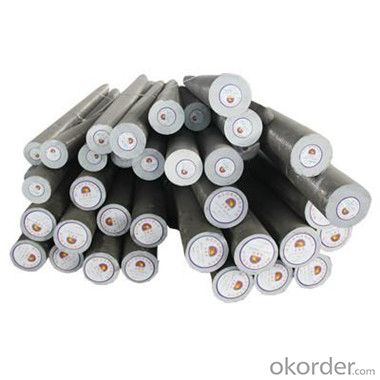
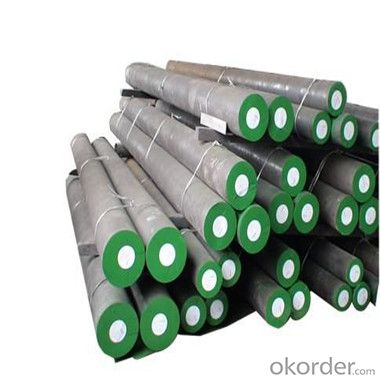
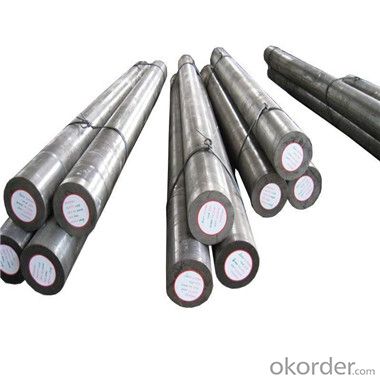
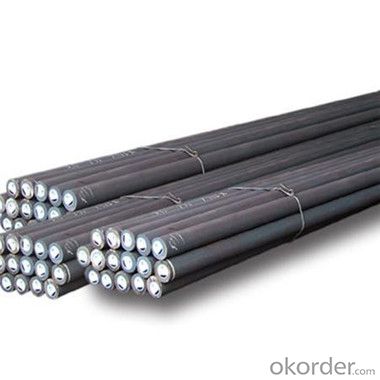
- Q:What is a steel round bar?
- A steel round bar, a lengthy metal rod with a circular shape, is usually made of strong and durable steel, an alloy composed mainly of iron and carbon. The round bar finds wide usage in industries like construction, manufacturing, and engineering, thanks to its flexibility and dependability. It is frequently employed as a structural element in buildings, as reinforcement or support in concrete structures, or as a part in machinery and equipment. The round shape enables effortless handling, machining, and welding procedures. Steel round bars are available in different diameters and lengths, and they can be further tailored or manufactured to suit particular project needs.
- Q:How do steel round bars contribute to sustainable construction?
- Steel round bars contribute to sustainable construction in several ways. Firstly, steel is a highly durable and long-lasting material, which means that structures built using steel round bars have a longer lifespan and require less maintenance and repairs over time. This reduces the need for frequent replacement, thereby conserving resources and reducing waste. Secondly, steel is a recyclable material, and steel round bars can be easily recycled and reused in other construction projects. By promoting the use of recycled steel, we can reduce the demand for raw materials and minimize the environmental impact associated with steel production. Additionally, steel round bars offer excellent structural strength and flexibility, allowing for more efficient designs and optimized use of materials. This results in lighter and more sustainable structures that require fewer resources to construct. Lastly, steel round bars are often used in reinforced concrete structures, which can enhance the durability and seismic resistance of buildings. By utilizing steel reinforcement, we can ensure the longevity and safety of structures, reducing the need for reconstruction and enhancing the resilience of our built environment. Overall, steel round bars contribute to sustainable construction by promoting durability, recyclability, resource efficiency, and improved structural performance in buildings and infrastructure projects.
- Q:What are the different types of steel round bars used in the power generation industry?
- In the power generation industry, various types of steel round bars are utilized for different applications. These round bars are specifically chosen for their unique properties and characteristics that are required in various power generation processes. Some of the different types of steel round bars commonly used in the power generation industry include: 1. Carbon Steel Round Bars: Carbon steel round bars are widely used due to their affordability, strength, and ease of fabrication. They are commonly used in power generation equipment such as turbines, generators, and boilers. 2. Alloy Steel Round Bars: Alloy steel round bars are made by combining carbon steel with other elements such as chromium, nickel, and molybdenum to enhance their mechanical properties. These bars offer increased strength, corrosion resistance, and heat resistance, making them suitable for high-pressure and high-temperature applications in power plants. 3. Stainless Steel Round Bars: Stainless steel round bars are highly corrosion-resistant and exhibit excellent heat resistance. They are commonly used in power generation equipment that comes into contact with water or steam, such as condensers, heat exchangers, and valves. 4. Tool Steel Round Bars: Tool steel round bars are known for their exceptional hardness, wear resistance, and toughness. They are commonly used in power generation equipment that undergoes frequent machining, cutting, or forming processes, such as drilling equipment and turbine blades. 5. High-Speed Steel Round Bars: High-speed steel round bars are specifically designed to withstand high temperatures and maintain their hardness and cutting ability at elevated speeds. They are commonly used in power generation equipment, such as cutting tools, drills, and milling machines. 6. Duplex Steel Round Bars: Duplex steel round bars are a combination of austenitic and ferritic stainless steels, offering excellent strength, corrosion resistance, and weldability. They are commonly used in power plants for applications such as piping systems, pressure vessels, and heat exchangers. It is worth noting that the specific steel round bars used in the power generation industry can vary depending on the requirements and operating conditions of each power plant. Therefore, it is essential to consult with engineers and experts to determine the most suitable type of steel round bars for a particular power generation application.
- Q:Are steel round bars suitable for use in the construction industry?
- Yes, steel round bars are commonly used in the construction industry due to their strength, durability, and versatility. They provide structural support in various applications such as reinforcement in concrete, framing, and the creation of beams and columns. Additionally, steel round bars can be easily fabricated, welded, and formed into different shapes, making them a suitable choice for a wide range of construction projects.
- Q:What is the maximum sulfur content allowed for steel round bars?
- The maximum sulfur content allowed for steel round bars can vary depending on the specific grade and specification. In general, the sulfur content in steel is controlled to ensure good machinability and overall quality of the material. For most commercial grades of steel round bars, the maximum sulfur content is typically limited to around 0.05% to 0.08%. However, it is important to note that certain specialized grades or applications may have different limits or requirements. It is always advisable to consult the relevant standards or specifications for the specific grade of steel round bars to determine the maximum sulfur content allowed.
- Q:What are the different types of steel round bars used in the automotive exhaust systems?
- Automotive exhaust systems utilize various types of steel round bars, each possessing distinct characteristics and uses. Let's explore some of the commonly employed varieties: 1. Stainless Steel Round Bars: Renowned for its exceptional resistance to corrosion and high temperatures, stainless steel stands as a favored option for exhaust systems. Its versatility allows for application in both primary and secondary components, including headers, catalytic converters, and mufflers. 2. Carbon Steel Round Bars: Carbon steel represents another frequently employed material in exhaust systems. Its commendable strength and durability render it suitable for various components, such as exhaust pipes and hangers. However, due to its susceptibility to corrosion in comparison to stainless steel, appropriate coating or treatment becomes imperative to prevent rusting. 3. Aluminized Steel Round Bars: Aluminized steel, a form of carbon steel coated with an aluminum-silicon alloy, boasts excellent corrosion resistance and heat reflectivity. These attributes make it an ideal choice for exhaust systems, particularly in exhaust pipes and mufflers, as it aids in heat reduction and enhances overall durability. 4. Titanium Round Bars: Although less commonly utilized due to its substantial cost, titanium serves as an extraordinarily lightweight and durable material, offering exceptional corrosion resistance. In high-performance or specialized exhaust systems, titanium round bars may be incorporated to reduce weight and improve overall performance. Its presence is often observed in exhaust tips and high-end aftermarket exhaust systems. In conclusion, the selection of steel round bars for automotive exhaust systems hinges on various factors, including cost, performance requirements, and specific application needs. Manufacturers meticulously choose the appropriate steel type to ensure longevity, efficiency, and compliance with emissions regulations.
- Q:Can steel round bars be used in the hydraulic industry?
- Certainly, the hydraulic industry can make use of steel round bars. Renowned for their robustness, endurance, and immunity to corrosion, steel round bars prove to be ideal for a wide range of applications within the hydraulic industry. They find utility in the production of hydraulic cylinders, pistons, and other components necessitating exceptional tensile strength and dependability. Moreover, steel round bars can be conveniently machined and fashioned into diverse dimensions and specifications, ensuring they align with the precise requirements of hydraulic systems. In essence, owing to their exceptional mechanical characteristics and adaptability, steel round bars remain a favored choice in the hydraulic industry.
- Q:What are the advantages of using niobium-alloy steel round bars?
- There are several advantages to using niobium-alloy steel round bars. Firstly, niobium-alloy steel has excellent strength and toughness properties. The addition of niobium to the steel increases its strength while maintaining its ductility, making it ideal for applications that require high strength and durability. This allows niobium-alloy steel round bars to withstand heavy loads and shocks without deforming or breaking easily. Secondly, niobium-alloy steel has a high resistance to corrosion. This makes it suitable for use in harsh environments where exposure to moisture, chemicals, or corrosive substances is common. The corrosion resistance of niobium-alloy steel ensures that the round bars will remain intact and retain their structural integrity over time, reducing the need for frequent replacements and maintenance. Additionally, niobium-alloy steel has excellent weldability and formability. It can be easily welded and fabricated into various shapes and sizes, making it adaptable to different manufacturing processes and applications. This versatility allows for the production of custom-designed round bars that meet specific project requirements. Moreover, niobium-alloy steel has good heat resistance properties. It can withstand high temperatures without losing its strength or undergoing significant changes in its mechanical properties. This makes it suitable for applications that involve exposure to extreme heat or thermal cycling, such as in the aerospace or automotive industries. Furthermore, niobium-alloy steel is known for its excellent fatigue resistance. It has a high endurance limit, which means it can withstand repeated loading and unloading cycles without experiencing fatigue failure. This makes niobium-alloy steel round bars ideal for applications that involve dynamic or cyclic loading, such as in structural components or machinery. In conclusion, the advantages of using niobium-alloy steel round bars include high strength, corrosion resistance, weldability, formability, heat resistance, and fatigue resistance. These properties make niobium-alloy steel a reliable and cost-effective choice for various industries and applications.
- Q:How do steel round bars compare to wood round bars?
- Steel round bars and wood round bars have several distinct differences that set them apart. Firstly, steel round bars are significantly stronger and more durable than their wooden counterparts. Steel has a much higher tensile strength, making it capable of withstanding heavy loads and resisting bending or breaking. This makes steel round bars ideal for applications where strength and durability are paramount, such as in construction, engineering, or manufacturing. On the other hand, wood round bars have their own advantages. Wood is a natural material that is lightweight and easy to work with. It can be easily cut, shaped, and crafted to fit specific requirements. Additionally, wood has a warm and aesthetic appeal that steel lacks, making it a popular choice in furniture, interior design, and other decorative applications. Another significant difference lies in their resistance to environmental factors. Steel is highly resistant to moisture, pests, and rot, making it suitable for outdoor or high-moisture environments. Wood, however, is susceptible to these elements and requires regular treatment and maintenance to prevent damage. Cost is another factor to consider. Steel round bars are generally more expensive than wood round bars due to the higher cost of materials and production processes involved. Wood, being a natural resource, is often more cost-effective. Ultimately, the choice between steel and wood round bars depends on the specific requirements of the project. If strength, durability, and resistance to environmental factors are crucial, steel round bars are the preferable choice. However, if a lightweight, aesthetic, and cost-effective option is required, wood round bars may be more suitable.
- Q:Are steel round bars resistant to chemicals or acids?
- Yes, steel round bars are generally resistant to chemicals and acids due to their high corrosion resistance properties. However, the level of resistance may vary depending on the specific type of steel and the concentration and temperature of the chemicals or acids involved.
1. Manufacturer Overview |
|
|---|---|
| Location | |
| Year Established | |
| Annual Output Value | |
| Main Markets | |
| Company Certifications | |
2. Manufacturer Certificates |
|
|---|---|
| a) Certification Name | |
| Range | |
| Reference | |
| Validity Period | |
3. Manufacturer Capability |
|
|---|---|
| a)Trade Capacity | |
| Nearest Port | |
| Export Percentage | |
| No.of Employees in Trade Department | |
| Language Spoken: | |
| b)Factory Information | |
| Factory Size: | |
| No. of Production Lines | |
| Contract Manufacturing | |
| Product Price Range | |
Send your message to us
Q345B st52-3 Cr50 S355JR Steel Round Bar
- Loading Port:
- China main port
- Payment Terms:
- TT OR LC
- Min Order Qty:
- 5 m.t.
- Supply Capability:
- 100000 m.t./month
OKorder Service Pledge
OKorder Financial Service
Similar products
New products
Hot products
Related keywords
